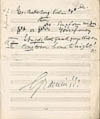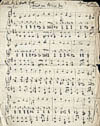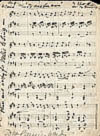




Please click any thumbnail image to view the full details.
There are 900 entries.
1 > 2 > 3 > 4 > 5 > 6 > 7 > 8 > 9 > 10 | next 10 of 90 pages
| Image | Title | Item Description |
|---|---|---|
 JSS0051 |
Bruce's March | Manuscript of Skinner's Bruce's March, in Gavin Greig's hand, so precise and clear, that the note stems could almost have been made with a ruler. To be played Boldly, the tempo is 112, slightly slower than two marching paces per second. The simple accompaniment consists mostly of octave quavers in the bass. The single virtuoso variation, 'Var. with force', takes up the remaining three single staves. King Robert the Bruce (the title in Skinner's Scottish Violinist, 1900) was Robert I, Earl of Carrick (1274-1329). Bruce had a famous victory against Edward II (the 'Hammer of the Scots') at Bannockburn, near Stirling, in 1314. The character of Bruce appears alongside William Wallace (the 'Scottish Patriot') in the Oscar-winning 1995 film 'Braveheart'. |
 JSS0052 |
Tullyveolan March | Skinner's Tullyveolan March, in the hand of the arranger, Herr Adolf Roloff; to be played risoluto - resolutely. 'Tullyveolan' seems to have been inserted later, as if Roloff had been uncertain of the title. The piece is set in 4 three-stave systems, the top stave for violin, the second and third for the piano right and left hands. Unusually for Skinner, the second section is a Trio marked p (piano - softly) and leggiero (lightly), its decorative rhythms contrasting with the simpler melody of the first part. Skinner reminds himself to 'See Sir Walter Scott's "Waverley."' Craighall, Perthshire, the residence of Major-Gen(eral) Clerk Rattray, C. B., is the original of "Tullyveolan". Novelist Scott (1771-1832) visited Craighall Castle, the seat of Clan Rattray, and set his novel Waverley (1814) in nearby Tullyveolan, Perthshire. When his publishers (Ballantyne's) business failed, the book helped restore his fortunes after losing all. |
 JSS0053 |
The Dear Auld Ha' | Music in Skinner's and Greig's hands of an song arrangement of 'The Dear Auld Ha' [hame - home] by: Scott Skinner arr: by Gavin Greig'. At the left top Skinner writes that the words were 'Written by Late C. M. and Gramin - '. C. M. was probably Charles Middleton, Keith, who died in 1899, the year before the Harp and Claymore appeared. Middleton published collections of fiddle music, including one by Peter Milne, Skinner's friend from his boyhood, as well as a newspaper, the Keith Sentinel, for several years. Gramin was the pen-name of song-writer George Gordon Ingram, for whom Skinner wrote music mentioned elsewhere. The piece, in D major, lacks a time signature, but is in 4/4. There are 4 three-stave systems, the top the violin, the second and third for the piano part. In the top left margin Skinner writes 'Sym', short for a Symphony, here meaning the three-bar introduction to the piece. Some of the notes in the piano part are incomplete - without noteheads. Gavin Greig clearly knows which chords he plans to write, but hasn't thought it necessary to include them at this stage. |
 JSS0054 |
The Dear Auld Ha' | Verso of The Dear Auld Ha' page 1. Manuscript in Skinner's hand, piano part in Gavin Greig's hand. The page begins with the last two bars of The Dear Auld ha' (hame - home). At the bottom of the page, Skinner writes 'My dear Gavin Greig I am glad you have taken to these simple words. I add a short Sym[phony] - [an introduction]: D (flat) - would be better - then the highest note would be F (natural) - C is not a favourite Key with me - too harsh - fine for fireworks -'. Written in larger script, and underlined for emphasis is 'Gramin is on the sea! - coming to see me here. he [sic] will compose 2 more Verses if you are not doing it - would we require per[mission]: from late Chas' [Charles's] wife to use the 1st Verse - She has a shop in Hamilton' (Lanarkshire). Charles Middleton, Keith, died in 1899. He published collections of fiddle music, including that by Peter Milne, Skinner's friend from his boyhood, as well as the Keith Sentinel, a newspaper, for several years. Gramin is the pen-name of George Gordon Ingram (1848 - after 1900) b. Glenrinnes, Morayshire; a song writer, and Church of Scotland precentor. Ingram, who had taught music locally in Huntly, emigrated to the United States (St Paul, Minnesota) around 1890, and from this note seems to have returned to Scotland sometime before 1900. |
 JSS0055 |
The Dear Auld Ha' | The Dear auld ha' [hame - home], page 3. This seems to be partially a reply to Greig about the book layout: 'Yes. Cradle Song Violin [three sharps, key signature for A major] Solo - then Do [ditto] - Song from under [a treble clef followed by two sharps, key signature for D major] or [a treble clef followed by five flats, key signature for D flat major]. Your fancy'. Skinner then adds a paraphrase of the words to his lullaby the Cradle Song: 'Angels that guard young children Come to our home tonight &c [etc.]'. The note finishes with 'Gramin!!!', scrawled cheerfully across the page as Skinner anticipates the return of his friend George Ingram from the United States. |
 JSS0056 |
Twist Ye Twine Ye | The manuscript words for Twist ye, twine ye, in two hands, with Skinner's title and attribution: 'Written by Sir Walter Scott "Twist ye, twine ye"', with 'J Scott Skinner' in the top right corner. Verses two and three of Scott's poem (as set by Skinner), in two columns, are in a different hand. The verse on the right has been pasted on to the page. In the right margin, Skinner writes, perhaps to his publisher,'Is there any copyright of the words?' |
 JSS0057 |
Twist Ye Twine Ye | Skinner's (and Gavin Greig's) arrangement of Twist ye twine ye, without words. To the left is 'Written by Sir Walter Scott', with 'J. Scott Skinner' to the right. There are three staves of music, in four systems. The simple 4/4 melody, in E minor, is written mostly in four notes (crotchets) to each bar. The piano accompaniment has the bass on the beats, and shorter notes in the right hand, on the off-beats. |
 JSS0058 |
Twist Ye Twine Ye | The melody only, in Skinner's hand, of the song Twist ye twine Ye. 'Spinnin' Song' is to the left of the title, 'J. Scott Skinner' to the right. There are four staves of music, the tune on staves one and three. This version, where the melody is written in quavers, and in the key of F sharp minor, is probably Skinner's original, since when it was published it was in crotchets, as shown in JSS0057. Under the music Skinner wrote: 'See Sir Walter Scotts [sic] Miscellaneous poems and add words neatly in columns - '. Although not given here, the inside pages include a variation to the 'Bonnie Lass o' Bon Accord' - 'arr by Gavin Greig'. The variation starts in A minor, and ends in A major. The notes, in Skinner's hand, read: 'or should we finish [the variation] in the Minor??' (key). A further page reads: 'Mind its gaun a' ower the warld - [Remember that it - the music - is going all over the world] I have the printed 6 Verses by W[illia]m & will paste them under your M.S. when it comes - Peace proclaimed this day [the end of the Boer War, 1899 - 1902] and while Mr Ferguson [of Skinner's publishers Bayley and Ferguson] closes [finishes his business with?] with Mr. McHardy - gentle [illegible] after the batterin' Will --- are you at Preface?' |
 JSS0059 |
To ane far awa | 'Song. W Carnie. "To ane far awa" by J. Scott Skinner arr[anged]: by Gavin Greig', in Skinner's hand, on pre-printed three-stave music paper. This appears to be Skinner's, rather than Greig's, arrangement. The melody in bars 1 and 3 is incorrectly notated: the first two notes should be dotted quavers followed by semi-quavers. Along the right-hand margin is written 'Please send a copy for Nellie to sing - '. There are a few dynamics, in pencil, and, at the bottom, 'To W[illiam] Carnie's Words'. |
 JSS0060 |
To ane far awa - words | To Ane Far Awa' [away] - verses two and three of William Carnie's words, presumably in his hand; verse 2: 'Tis years, O langsome years, Tom, Since I last saw your face; And sometimes I hae [have] fears, Tom, Anither [another] fills my place. But, hap[pen] what will, or come what may, I'll ne'er forget, or blame the day[,] I promised to be thine for aye [ever], For thine I hope to be, Tom. Verse 3: Ye'll read this simple sang, Tom, In yer hame across the sea; And ye'll ken [know] I'm thinkin' lang, Tom, to look again on thee: - To hear yer kindly voice ance [once] mair [more, To hear ye praise my face and hair, To hear ye say that nane shall share Yer heart and hame but me, Tom. |
1 > 2 > 3 > 4 > 5 > 6 > 7 > 8 > 9 > 10 | next 10 of 90 pages

